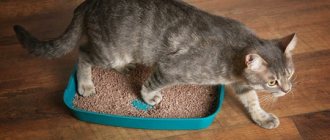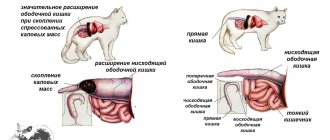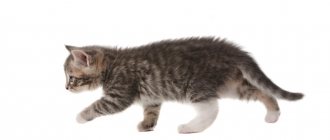It happens in life that an adult cat went to the litter box and then stopped. While some try to yell at their pets for such misdeeds, others patiently wipe the floor, philosophically saying, “What can we do?” But there is always a reason for everything. It’s just that sometimes we cannot determine it, because... it is not obvious. But the problem can be easily fixed.
The Murkotiki website has compiled the most complete list of factors that lead to the fact that a cat begins to go not in the litter box, but in the corners, in the bathroom, in the sink, in slippers, or even on the bed. So, why doesn’t the cat go to the litter box and what to do about it?
Article continues after advertisement
Reason No. 2: not satisfied with the place
Any living creature feels vulnerable during urination or defecation. But if you understand that there is no threat in the apartment, then the cat does not understand. He is driven by the ancient instinct of self-preservation. Some cats can do their business in front of everyone right in the middle of the room, moreover, at this moment they need company. Others are so anxious that they only want to go to the toilet in a secluded place. If your cat is like this, try to place the litter box away from walk-through areas and buy a house tray.
Safety
When a cat relieves itself, at this moment it is as unprotected as possible, therefore, if it is uncomfortable on the tray, there is no feeling of security, it will prefer to ignore trips to its toilet. To save space, owners often place cat litter boxes in too secluded, dark places, such as niches. Or the tray is squeezed into the tight space between the bathroom washing machine and the wall.
If your pet feels uncomfortable on the tray, don’t be surprised that he will simply start to ignore it.
The cat litter box should be located so that the cat has several approaches to it, and from different sides. In addition, there should be enough space around it.
Reason No. 3: not satisfied with the filler
Did your cat stop going to the litter box after changing the litter? Then the reason is obvious: the new filler did not suit him. Cats prefer clay clumping litters. Other options may not be recognized if you are not accustomed to them from childhood.
Moreover, cats do not like toilets without any filler at all, because... They don’t see the difference between the floor and the tray: they are equally smooth, so what’s the difference then? Therefore, the tray must contain at least some bad filler.
It is not advisable to change the type of litter if the cat is already accustomed to a specific one. Smelling a different smell or seeing a different consistency, she may think that this place has become unsuitable for the toilet, and will go in search of a new one. Similarly, by the way, the cat will decide if you use aggressive products that leave a pungent odor when washing the tray. You may not feel it, but the “aroma” will hit your cat’s nose. Use soap that washes off easily and leaves no odor.
Wrong filler
Cats are self-sufficient and fastidious animals. Often the reason that a pet categorically refuses to go to the litter tray is that the owner does not like the litter chosen by the owner. At the same time, even in the filler he doesn’t like, he will still write.
This is explained by the fact that the animal spends much less time on the process of urination than on defecation. Therefore, if the cat is uncomfortable with its paws immersed in the litter for some time, it will walk past the tray. It is easy to solve this problem - just change the type of cat litter.
Reason #4: the cat doesn’t get into the litter box
Do you find shit and urine near the tray? Or does the cat just shit next to the litter box? It would seem, what kind of animal is this that knows its place, but walks by in a small way or in a big way? What kind of pest? Perhaps he did not want to do dirty tricks at all. Think about whether the tray size is sufficient? If the cat does not fit into the tray and cannot turn around freely, he pees and poops by. Try replacing the tray with a wider one, with higher sides, or even a house tray. Read our review on how to choose a litter box for your cat.
Behavioral aspect
Well, what could be easier than to explain the behavior of a cat? Unless you prove Fermat's theorem
The main psychological reasons for the uncleanliness of cats:
- Disgust: I don’t like the place where the tray is. Or its filler
- Preference: I like a certain place (oh, but the tray is not there at all!). Or a certain filler (and which one, let the owner guess for himself)
- Insufficient cleanliness of the toilet: the filler must be changed in a timely manner, and the tray must be washed. And preferably with a soap solution, and not a toxic chemical
- Intraspecific aggression: social friction between cats living in the same apartment
- Increased anxiety: stress caused by moving or renovation, the appearance of a new family member or animal, changes in noise or smell, family quarrels, a trip to the clinic, resentment towards the owner, etc. For example, the reason for walking past the potty may be the appearance of a small child in the neighbors' house. Go figure!
If a cat leaves “standard” puddles or piles in the wrong place, then this is most likely a psychological problem. If urination is frequent and in small portions, a doctor is needed. The same thing applies to “unhealthy” stools.
From personal experience. When puddles or piles are left in the “frontal area” (on the sofa, bed or just in the middle of the room) – this is generally revenge. Think about what you did wrong?
A medical cause can easily turn into a behavioral one and vice versa. Painful sensations when urinating or defecating during illness are transferred by the cat to its tray and create a persistent aversion to it, which remains even after recovery. And severe stress, in turn, can provoke some kind of disease of the genitourinary system (idiopathic cystitis, urolithiasis).
It happens that both medical and behavioral causes are present at the same time. Bingo!
Reason No. 5: the cat does not want to go into a dirty litter box
Many cats are terrible tidies: they will not go into a litter box that they have already used and which you have not had time to clean up. Likewise, they will not go to a toilet that has to be shared with another pet. If you are lucky and your cat is like this, you will have to constantly monitor the cleanliness of the toilet.
There are also clean people who like to go to one tray when they need a lot, and to another when they need a little. In this case, you will need two trays and place them close to each other.
Article continues after advertisement
We exclude medicine
If the tray is always clean and smells quite pleasant, then why does the animal still not change its habit of ignoring it, defecating past it, as if out of spite? In this case, it is worth observing the animal, perhaps the development of various diseases is to blame.
The most common cause of strange cat behavior is the presence of frequent constipation in the pet. The cat begins to associate his toilet with unpleasant, uncomfortable sensations, which is why he prefers not to go to it.
Another reason for this behavior is related to the age of the cat - quite often older cats develop a disease such as arthritis. Due to joint pain and stiffness, they are simply unable to perch on a tray with high sides.
In addition, there are also psychological factors, for example, when the owner uses a closed house as a cat litter box. Of course, it looks interesting and aesthetically pleasing, it traps odors, but in most cases cats feel uncomfortable and uncomfortable in such houses, so they prefer to ignore it.
Reason #6: stress
Stressed cats can also experience toilet misfires. For example, a new person/animal appeared in the family or someone died, you moved to another apartment or rearranged the furniture, you became pregnant or began to pay less attention to the cat. These are all reasons for concern. Cats are very sensitive and may start walking past the litter box due to their worries. In this case, you need to try to identify and eliminate the cause of stress, calm the cat, and pay more attention to it. In especially severe cases, cat sedatives will be needed.
Manifestation of cat instincts
Some pets' natural instincts are so pronounced that they cannot relieve themselves of small and large needs in one place.
This is explained by the fact that cats associate the process of urination with the process of marking their territory, which is why they begin to walk past the litter box when defecating.
How to get out of this situation? It is recommended to place two litter boxes for your pet, but not next to each other (this arrangement of toilets will not solve the problem), but at some distance - these can be different corners of the same room, and sometimes even different rooms. Only trial and error will help you achieve the ideal placement of two toilets.
Reason #7: the cat is in pain
In a situation where your pet has been consistently going to the litter box all his life, and then suddenly stops, you should first of all suspect a disease that causes him pain and discomfort when urinating or defecating. This could be, for example, cystitis or urolithiasis. Cats are not very intelligent creatures, and therefore they sometimes blame the tray for the appearance of pain and think that if they change the place, the pain will go away.
Urolithiasis is not a death sentence, but a serious diagnosis. The earlier treatment is started, the greater the chance of remission. Watch the cat for several days. Maybe he's peeing blood? Maybe he meows plaintively before or after bowel movement? Maybe he only pees by the tray and poops in it? All this should be alarming. But in any case, you should go to the veterinarian, because... Urolithiasis can develop without noticeable symptoms.
You should especially worry if a neutered cat stops going to the litter box, because... Neutered men have a several-fold increased risk of developing urolithiasis. This applies specifically to cats, not cats.
After treatment begins, the pet will recover, and the pain will disappear - and the animal will most likely return to the litter box. However, a medical problem can turn into a behavioral one: at first the cat thought that the tray was to blame for the pain, so he started going in the wrong place - and the pain disappeared (due to treatment, but he does not understand this). Therefore, the cat thinks that his tactics of changing places worked. And now we need to eliminate the behavioral problem. Buy a new tray, put good litter in it, place the toilet in a different place (for example, in the one the cat has chosen): let him not associate the new toilet attributes with the old ones and do not think that they can cause unpleasant sensations.
The cat started shitting past the litter box: 10 reasons for your pet’s behavior
Many people believe that a cat shits out of spite and takes revenge. However, this is not such a common reason. There are many more of them. The Scots conducted an interesting study. On their resource “Murkotiki” they provided a complete list of reasons for this behavior in pets. Let's focus on the main ones.
- Not happy with the place
. Not every cat can do its business in front of people, although there are such animals. But in most cases, the instinct of self-preservation forces cats to hide in secluded corners, because they do not understand that there are no threats in a modern apartment or house. To solve the problem, just put the tray in a secluded place or purchase a tray house.
- The tray does not meet the animal's needs
. When your pet was a kitten, he was quite happy with the litter box, as he had enough space in it. But he grew up. It became difficult for him to fit and turn around in the small tray. Therefore, the cat began to leave excrement next to the tray. The way out of this situation is simple - buy a more spacious tray.
- I don't like the filler. One of the most favorite litters for cats is clay clumping litters. But there may be other preferences if the kitten is accustomed to them from an early age. When a cat sees another litter in the tray, it may not like it. Then the pet arranges a toilet where it pleases. Then you will have to return to the old filler or buy a similar one.
- The tray is not kept clean.
Some cats are ready to go to the same litter box for small and large needs, even if other pets use it. Others, the majority, will not sit in the tray again if you don’t clean up after them. Therefore, pay close attention to your pet and its needs. If he needs two trays so that he can pee in one and poop in the other, meet the animal halfway.
- Stressful situations.
There can be a lot of them in a cat’s life: the arrival of a new person or the death of a relative, moving to a new place, repairs, rearranging furniture. Even if the owner begins to work late and pay less attention to the animal, stress is inevitable. Pet feeling anxious. Walking past the tray, he tries to inform the owner about his condition, or to do everything “as it was before.” Especially often, cat marks can appear when the pet does not like new smells. Try to calm the animal; in especially severe cases, use a sedative.
- Disease
. If a cat has cystitis or urolithiasis, she thinks that the litter box is to blame for her pain, so she starts urinating anywhere. To understand that a cat is susceptible to urolithiasis, you need to observe it. If blood appears during a bowel movement, or after it the cat begins to “complain,” contact a veterinarian. The sooner you start treatment, the better.
It is not a fact that after the cat is cured, it will defecate in the litter box again. In all likelihood, she will think that the pain has gone away because she did not pee in it. In this case, you will have to buy another tray and re-accustom the animal to it. It is important that he stands where the cat usually does his business.
- Provocation.
Sometimes the pet begins to behave demonstratively. He may be trying to attract the owner's attention or challenge him. If a cat’s demonstrative behavior is associated with a complex character, you will need to consult a specialist animal psychologist. But most often the animal is simply trying to attract attention. He notices that the owner scolds him when he shits in the wrong place. Consequently, the goal has been achieved and attention has been received. The cat behaves in such a situation in the same way as some people who want to at least somehow react to their behavior, even negatively. If a cat does nasty things, it means he is not getting the attention he needs. - Revenge.
Some cat breeds, such as the Siamese, are very vindictive. If they felt that their person was treated disrespectfully or not given enough attention, expect a pile on an expensive carpet or described shoes. For example, if you drive a cat away from its favorite place, it will definitely respond. And you will have to throw out your slippers, or even expensive shoes. - Age
. When a cat is already “over”, she may suffer from incontinence and leave “surprises” in the most inappropriate place. Be tolerant of your pet and its advanced age. Buy cat diapers and they will save you from the problem. - Unwillingness to observe “etiquette”
. If a kitten came into your house from the street, where he defecated wherever he wanted, problems may arise with litter box training. There are obedient and smart cats who immediately understand what is wanted from them and go to meet their owner halfway. But this doesn’t happen all that often. Basically, if cats are used to relieving themselves in the open, I feel uncomfortable in the litter box. Therefore, the only way out is to let them out of the house so that they relieve themselves on the street.
You can try filling the tray with sand or soil instead of filler. Your pet will like this kind of filler more. Gradually add filler to the soil, replacing soil and sand with it.
Reason #8: the cat is marking its territory
The cat recently started peeing in the wrong places, but mostly goes to the litter box? Perhaps he is marking his territory. This will require castration. But occasionally it happens that a neutered cat continues to mark. This happens due to habit or stress when the cat feels insecure in its own territory. This problem can be solved by adjusting the habitat.
The problem of marks can also occur in cats, especially if there are several of them in the house. And in general, if there is more than one cat in a family, this is a provoking factor for marks. In this case, you need to try to normalize the relationship between the pets. And they need not one toilet for two, but... three. There should be one more tray than there are cats. The trays should be placed in different places: in those places where you most often find “gifts”.
Specific events
How to stop a cat from shitting when it happens in certain places on a regular basis? Several such characteristic places can be identified. Nature directs the animal to pots with home flowers, where it is attracted by the soft soil, and even with the smell of fertilizer. Of course, the easiest way is to put the flowers out of reach of the cat. In cases where this is undesirable, the following methods of influence can be recommended: placing a garlic clove or lemon peels on the soil surface; covering the surface (usually a window sill) on which the pots stand with foil or taping the area near the pot; placement of twigs around the perimeter of the pot, creating an interfering fence (toothpicks can be used). Such inconveniences will wean the animal from unscheduled toileting, and after a while all elements can be removed.
Vinegar will help stop your pet from pooping in the litter box.
On a note! If a cat gets into the habit of shitting on the bed, then measures must be taken as quickly as possible so that such comfortable conditions do not become a habit.
First of all, resolutely block the way to the bedroom by closing the door. Using lavender when rinsing bedding is considered a fairly effective method. You can simply apply a few drops of lavender oil to the top of your bed, especially at the head of your bed. Cats cannot stand the smell of lavender and will give up their intentions.
An animal can shit on the floor in different places in the apartment or run out into the entrance and defecate there. A vinegar solution can be considered an effective remedy. If you treat the floor with it, the cat will not make a toilet there. A positive result is achieved by using ready-made products intended for these purposes and sold in a pet store: Nature's Miracle, Odor-Secret, Nok-Out, Urine-Off. Sometimes the animal takes a liking to a certain corner in the apartment and does “its business” there. In this case, it is best to install a tray in this corner.
Nature's Miracle gives positive results
Finally, there is also a known radical way to stop a cat from crapping. The animal is locked in a small room (for example, a bathroom), where a tray is installed and a bowl of water is placed at a distance. To feed, the cat is taken to a bowl of food 2-3 times a day. The rest of the time she remains locked up and is forced to use the litter box. The cessation of isolation should be carried out gradually, as the animal gets used to the tray.
The question of how to wean a cat from shitting in the wrong place at home should be decided taking into account the reasons leading to this behavior of the animal. First of all, it is necessary to eliminate these causes and ensure maximum peace of mind for the cat. In the presence of diseases, the intervention of a veterinarian is necessary, but in other cases, a kind attitude towards your pet and patience will help.
Reason #10: demonstrative behavior
Perhaps walking outside the litter box is a sign the cat is sending you. Sometimes this happens when he wants to draw attention to a problem, for example, with health or improper placement of the tray. Sometimes provocative behavior is dictated by the fact that the pet wants to receive additional attention from you.
At first he didn’t receive enough attention, but then he noticed that you scolded him for his misdeeds, that is, you paid attention to him. After that, the cat began to do this just to get another portion of attention from you. You say it's stupid because it's negative attention? No, it's not stupid. This is how not only cat psychology works, but also human psychology: negative attention is much better than complete indifference. Watch the following video about people and you will understand a lot about cats.
Article continues after advertisement
How to prevent problems with the tray?
Good socialization of a cat from an early age significantly increases its ability to cope with stressful situations and reduces its need to mark and litter. At the same time, the stable and familiar smell of household items has a beneficial effect on cats. Try to experiment less with fragrances for clothes and deodorants and keep your special smell at home. If changes in your family life and environment are imminent, or, conversely, the cat must go to a new place, you must help the cat feel safe.
- A cat feels more relaxed in places where there is plenty of food, so a few food bowls placed in different places will also help in this situation.
- Allowing your cat to sleep on your bed or chair when you are not home will add to her sense of well-being and comfort. Place your pet's beds in warm places that the cat previously preferred. Cardboard boxes can be a cheap and effective solution.
- In addition, provide the ability to climb onto a cabinet or other furniture, which will increase the feeling of protection from external attacks.
- Wipe the cat with a soft cloth, paying particular attention to the tonsil area, and then wipe the cloth on vertical surfaces in the house at the cat's height. Smelling the pheromones from its facial glands will make your cat feel calm and significantly reduce its desire to poop. Cats never mark where there is scent from their facial glands. In pet stores you can also purchase the drug “Feliway”, an analogue of these pheromones, which helps restore good health and normalize the animal’s behavior in a stressful situation.
Reason No. 11: the cat stopped going to the litter box after the dacha
Separately, it is worth considering the complaint that the cat, after walking outside or going to the country, stopped pooping and peeing in the litter box. Some owners are afraid that the cat, having tasted the joy of going to the toilet outside, will then not recognize its substitute, that is, the litter box. Let's say that this problem is out of the ordinary. Usually cats know very well where the toilet is in the house, even if they went under a bush on the street.
But what to do if the problem has already appeared? Firstly, going to the toilet in the country should be avoided. Secondly, if possible, we don’t let the cat pee anywhere and spray it with a spray bottle if he settles down in another place, praise him for going to the litter box, and force him to go to those places where he has already gone.
Territory marking
Can't understand why a cat shits everywhere? Look out the window. It is likely that March has come and the cat has simply gone on a spree. Despite the fact that man domesticated the cat a long time ago, it still remains a wild creature. Therefore, they continue to communicate with the opposite sex like animals, through smells.
During heat, a cat may begin to shit in corners, unconsciously trying to attract cats with her scent. Male individuals also mark territory, thereby showing the boundaries of their possessions.
There are several ways to solve the problem:
- Give the animal what it wants - find a mating partner.
- Use hormonal drugs to reduce libido. They should be selected by a specialist.
- Once and for all, resolve the issue by castrating (sterilizing) the animal. This does not guarantee that the cat will stop shitting in the corners, but he will not mark his territory.
Reason #12: the smell clogs
Sometimes cats pee on the bed or other places to cover up the bad smell. For example, a child pees in the bed, a cat smells it and wants to kill it with its smell. Moreover, it is not even so important whether the child peed recently or a long time ago: cats have a sensitive sense of smell. Sometimes the issue can be resolved only by changing the bed linen or mattress. This situation is typical not only for beds. A noteworthy story is that of one man whose cat persistently peed on the parquet floor in his room, and then during the renovation it was discovered that dirty men’s trousers were walled up under the parquet. The cat smelled them and tried to cover it with her own.
How to fight?
Don't yell at the cat. It is worth talking to the cat in a calm tone. If the cause is JEALOUSY (very often such problems arise among owners who have small children under the age of 3, as well as those who keep several cats, or other animals besides a cat), then you should prove to the cat that you love only her . Spend more time with her, play more.
Memory of Infancy . Very often, small kittens, like children, are put in waterproof diapers in the nest basket - they are comfortable and hygienic, they are easy to change when they get dirty, the kittens grow, they begin to walk “for minor needs”, not yet knowing the tray, right on such a diaper. And with age, this topic remains in my head - the opportunity to go to the diaper. Just like cats have a desire to step over their paws, knead, and purr, their owner for the rest of their lives (this is what he does when he suckles his mother). Instead of a diaper, a soft cotton cloth can be used in the nest, which can also evoke some childhood memories and the desire to go to the toilet on a cloth. Usually by the age of 2 months such desires disappear (cats are clean animals). And if you have a small child and you use such diapers, then the advice is - you took a kitten that is still quite small, be patient and wait until the kitten grows up, or do not let the kitten near the crib.
But if the reason is LACK OF ATTENTION , it’s worth tinkering with the cat. Give it at least one hour a day, or ask the children to cuddle the cat more and play with it. There is a wonderful tool - a laser pointer beam. This toy allows the cat to run around and play to its heart's content, and the owner can play without getting up from his chair.
Resentment (one of the options for lack of attention). Watch your behavior and your cat's on the day she poops on the bed. Something in common may emerge - for example, she came to talk to you in the morning, and you brushed her off - so resentment and revenge in the form of a pile or puddle on the bed. Or the food was not put out right away and a whole bunch of other “little things” for you, but not for the cat.
HIGH SELF- ESTEEM is indeed a problem. If a cat jumps on the sofa, sit next to him, thereby showing that you also deserve this place (and do this in many ways. Not always - otherwise the cat will be offended. Just often). But if the cat gets really impudent, you should wag your finger. It should be like this all the time.
SADness is also a small problem. Add some excitement to your cat, play with it or make it an interesting toy.
No access to tray. And sometimes the most trivial problem happens - the cat was accidentally left in a room with a bed and was locked. The cat has nowhere to go, she can “go” to the bed (remembering that as a kitten she went to the cloth).
I don't like the tray or filler . This is a separate topic about the cat litter box. But it is precisely for this reason that sometimes cats refuse to go to the tray offered by the owners.
Reason #13: old age
In old age, not only people can suffer from incontinence, but also cats. Plus their mental abilities deteriorate. Then the cats start peeing and pooping anywhere. Don’t scold the respectable animal: it’s already difficult for him and he doesn’t do it on purpose. Instead, buy a litter box with low sides if you find that your pet has difficulty getting into the toilet. And it’s better to place several trays around the apartment so that the cat has time to reach them. Well, if your cat has incontinence, buy special cat diapers.
How to understand why a cat shits everywhere?
Before you begin to study ways to overcome a nasty habit, it is necessary to analyze the reasons for inappropriate behavior. Without a clear understanding of your motives, you will not be able to achieve a positive result. All the efforts of the owners will be in vain, and relationships in the house will go wrong.
There is a fairly impressive list of reasons why a cat began to shit anywhere. Each animal is different, so owners may have to work hard to solve the problem.
So, you noticed that the cat began to shit everywhere. What to do in this case? Let's figure it out.











